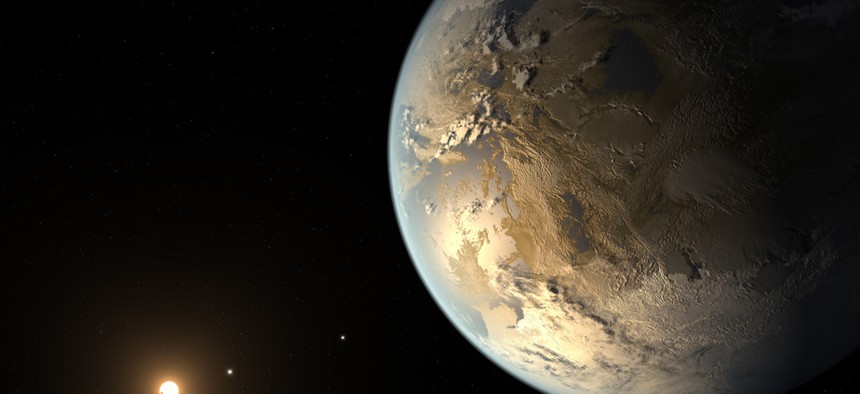
An artist's rendering of Kepler 186f, one of 1,000 Earth-like planets the Kepler spacecraft has uncovered. NASA
NASA Scientists Just Discovered the Most Earth-like Planet Ever
Kepler 438b is believed to be 12% larger than Earth and lies within its sun’s "just right" zone.
NASA announced the discovery of eight Earth-like planets outside of our solar system, and one of them has perhaps the best chance scientists have found yet for harboring extraterrestrial life.
Kepler 438b is believed to be 12% larger than Earth and lies within its sun’s “Goldilocks zone”—meaning its distance from the star is just right for potentially containing liquid water on its surface. It’s 475 lightyears away from us, which is quite close in the grand scheme of the universe but still very, very far away .
Launched in 2009, NASA’s $600 million Kepler spacecraft surveys the Milky Way for Earth-like planets orbiting other stars. To date, they’ve found 1,000 of them , and that’s only in our galaxy. Who knows how many untold cousins of Earth there are elsewhere in our galaxy and beyond?

It works, essentially, by observing the brightness of stars in a fixed view. Analysts on Earth then look for instances when an extrasolar planet crosses in front of its star, causing the brightness to dim. That might seem rather primitive, but a lot can be gleaned from that dimming. It can tell us the size of the planet, the shape of its orbit, its distance from the star—and can give us a fairly educated guess at what its composition is like. That said, these planets are too far away for us to directly observe or measure things like atmosphere.
Astronomers at the Harvard–Smithsonian Center for Astrophysics confirmed the existence of these new planets , using a computer program called BLENDER to rule out the possibility of false positives caused by stars crossing the view of other stars. They published their findings in the Astrophysical Journal .
The search for alien life will be boosted by the TESS satellite, launching in 2017, and the James Webb Telescope —Hubble’s replacement—which will be put into orbit in 2018.
NEXT STORY: How a DHS Document Dump Imperiled U.S. Security






